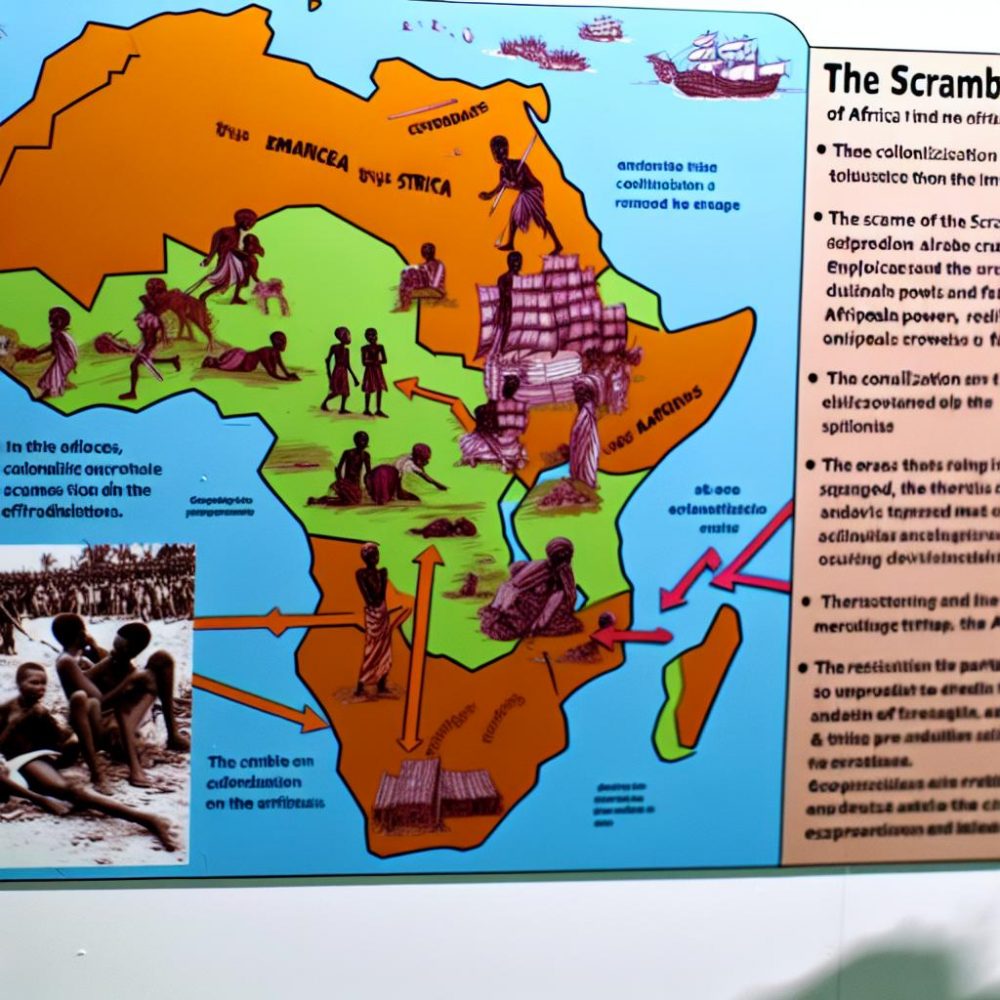
Introduction
The Scramble for Africa, a transformative period from the late 19th century to the early 20th century, saw European powers aggressively partitioning and colonizing the vast African continent. This era was marked by profound and lasting changes across Africa’s political, social, and economic spheres. European nations, driven by a quest for power and wealth, aimed to exploit Africa’s abundant resources and establish strategic dominions, ultimately leading to enduring consequences for both the continent and its inhabitants.
Political Impact
The political landscape of Africa underwent significant alteration as a result of the European partitioning. The drawing of artificial borders by colonial powers such as Britain, France, and Germany had far-reaching implications. These borders were often drawn with little consideration for the ethnic, cultural, and linguistic realities of African societies. This disregard led to the creation of multi-ethnic states, sowing seeds of discord and conflict that would persist long after African nations gained independence. The newly imposed colonial rule dismantled pre-existing governance systems, replacing them with European-style administrations. This transition centralized power, undermining traditional leadership and governance structures that had been in place for centuries.
Impact on Sovereignty
The imposition of colonialism meant a significant loss of sovereignty for African nations. Local rulers who resisted the encroaching colonial forces were frequently deposed or reduced to subordinates. Major decisions concerning administration, economic policies, and legal frameworks were dictated by European powers, effectively erasing any semblance of autonomy. This loss of sovereignty stunted the political development of African countries, creating a legacy of external dependency that continues to influence contemporary politics.
Economic Consequences
During the Scramble for Africa, the primary economic objective was the extraction of raw materials to feed European industrial growth. Colonizers exploited Africa’s extensive natural resources, which included valuable minerals, agricultural products, and human labor. The focus on extraction left little room for the development of local economies, resulting in economic structures that became heavily dependent on a narrow range of export commodities. Such economic strategies hindered diversification and stalled sustainable economic advancement.
Infrastructure Development and Its Dual Nature
Colonial powers invested in infrastructure during this era, but these developments were primarily designed to aid resource extraction and exportation. Railways, roads, and ports were constructed with a focus on connecting resource-rich areas to coastal ports, often neglecting broader regional development needs. This infrastructure facilitated the extraction of resources but did not support comprehensive economic development, shaping economic activity around extraction and severely limiting the potential for a more balanced economic growth across the continent.
Social and Cultural Effects
The societal landscape of Africa was significantly transformed under colonial rule. Traditional customs and social structures faced alteration or suppression as European colonizers imposed their cultures and values. The introduction of Western education, religion, and languages served as tools for exerting control and often led to the erosion of indigenous cultural practices and identities.
Urbanization and Social Change
The colonial period spurred urbanization, driven by the promise of work opportunities within administrative and trade sectors primarily located in cities. This migration to urban centers led to substantial social change, influencing family structures and altering traditional community dynamics. The rapid urbanization process created noticeable disparities between urban and rural areas, exacerbating socio-economic divides and contributing to a lingering sense of inequality.
Legacy of the Scramble for Africa
The legacy of the Scramble for Africa is both complex and enduring, with repercussions that have persisted long beyond the end of colonial rule. The arbitrary borders established during this epoch remain a source of conflict and political instability. These divisions have proven challenging to navigate, often igniting tensions among groups with differing ethnic and cultural identities. The economic systems and structures established under colonial rule further contributed to ongoing economic challenges across the continent. The historical context and lasting impacts of the Scramble for Africa are essential considerations for addressing contemporary issues, promoting reconciliation, and fostering sustainable development within Africa. Understanding this legacy is critical as nations work toward equitable growth and development, seeking to overcome the historical barriers instilled by colonial powers.
The Scramble for Africa remains a crucial chapter in both African and world history, shaping modern global dynamics and influencing current socio-political landscapes. As African countries continue to strive for economic independence and political stability, the lessons learned from this era serve as a guide for building a future grounded in unity, resilience, and self-determination.